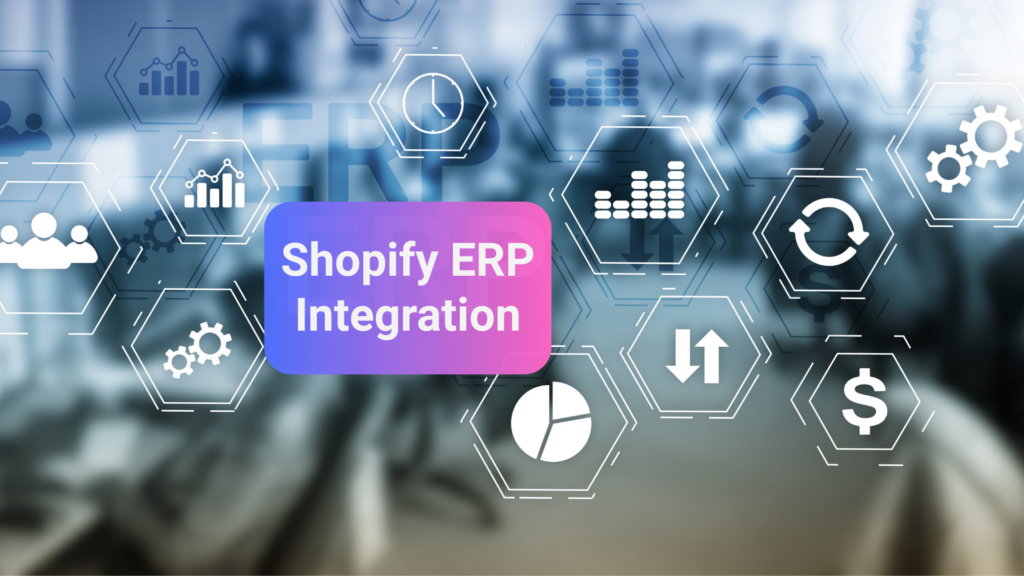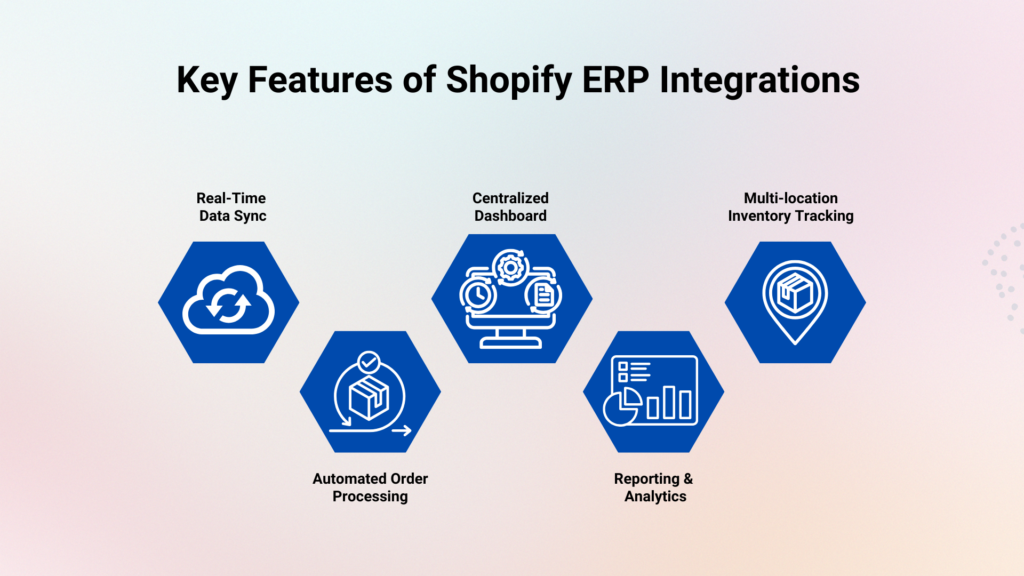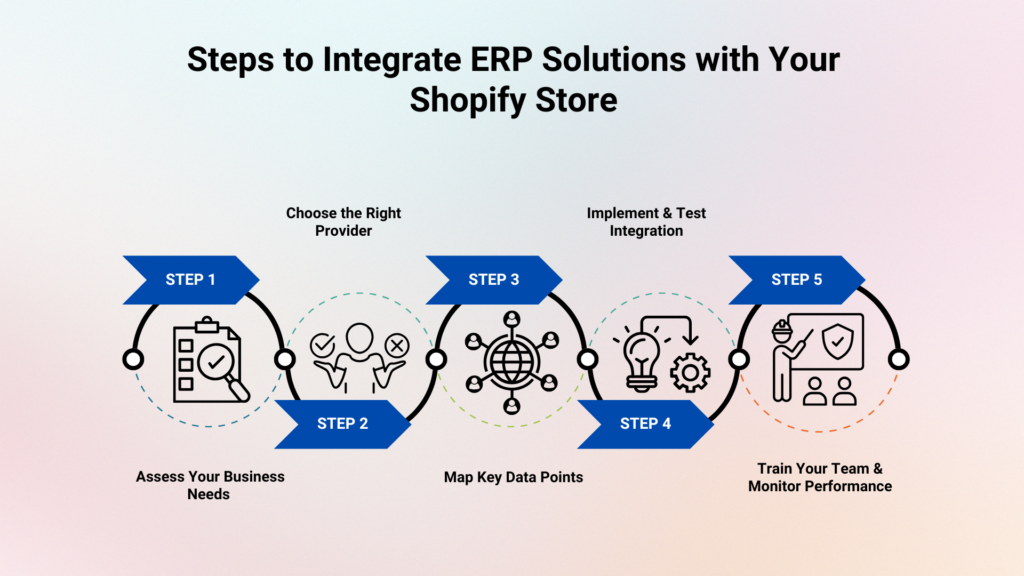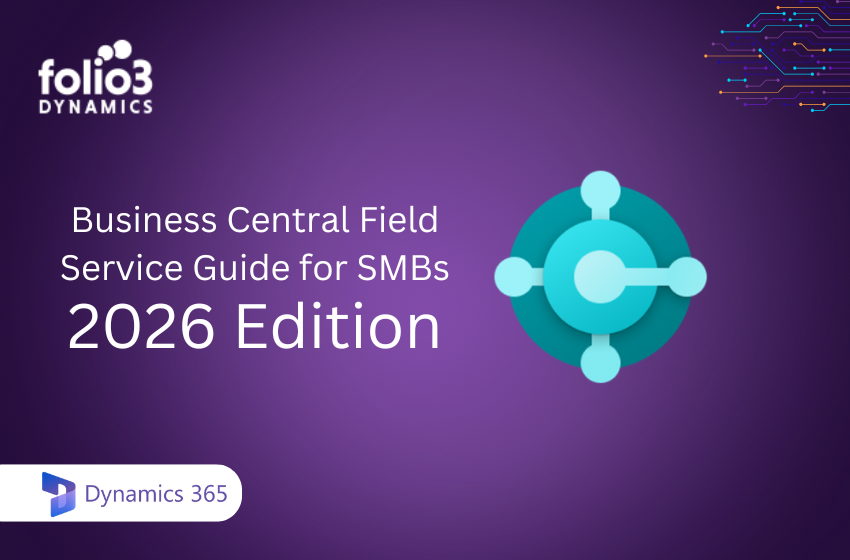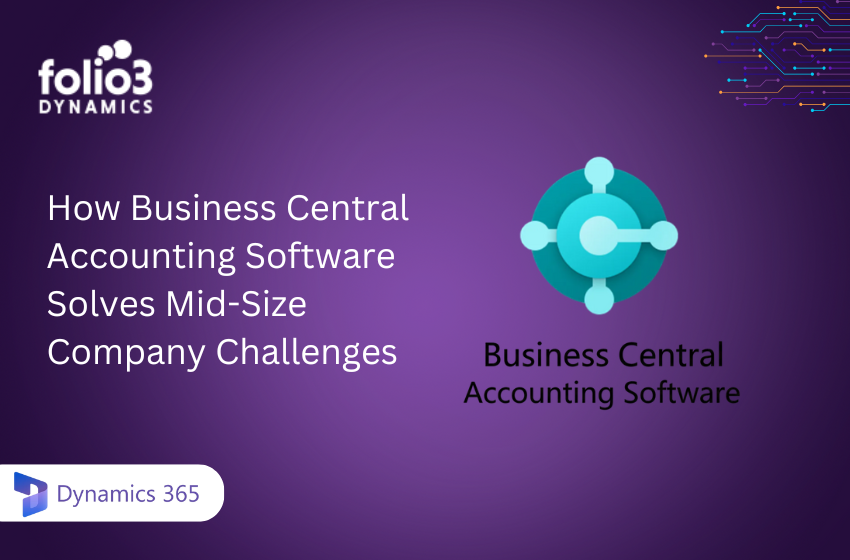Running a growing Shopify store often means juggling multiple systems – sales on the storefront, inventory in another, accounting in yet another. This disconnected setup can lead to time-consuming manual updates, out-of-stock blunders, and costly errors that hold your business back. Integrating Shopify with an ERP system solves these problems by connecting your store to inventory management, finance, and fulfillment in real time
Recent research shows that 91% of companies using ERP solutions have achieved better inventory management, resulting in lower holding costs and enhanced cash flow. By connecting Shopify to a backend ERP, businesses automate tasks like order processing and inventory tracking, which reduces manual errors and saves time.
This unified setup centralizes data, enabling faster decision-making and better customer service. In this blog, we’ll take a deep dive into the intricacies of Shopify ERP integration, followed by every relevant aspect to give you a clear view of this digital arena.
Struggling to Scale Your Shopify Store without Losing Control of Your Operations?
Learn how ERP integration can streamline your backend operations and unlock growth without the chaos.
What is Shopify ERP Integration?
A Shopify ERP integration is the process of connecting your Shopify store to an enterprise resource planning (ERP) system so that they work as one. In practice, this means syncing data like products, orders, customers, and inventory management between Shopify and the ERP automatically. When a customer places an order on Shopify, the integration pushes that order into the ERP and updates inventory counts across all channels in real time.
Likewise, changes made in the ERP (like new products or price updates) flow to your Shopify store. The integration essentially creates a single source of truth: sales, stock, accounting, and customer information all stay aligned without manual exports or re-entry. By automating these processes, ERP integration frees up hundreds of labor hours.
For instance, automating order-to-fulfillment means you no longer need staff to manually copy orders into the ERP, saving time and reducing mistakes. Many growing merchants partner with experts offering shopify erp development to ensure seamless data synchronization, reliable performance, and custom workflow alignment between systems. Inventory levels stay accurate no matter how many sales channels you have, preventing oversells. In short, Shopify-ERP integration turns what could be a tangled web of spreadsheets and portals into one smooth system.
Shopify ERP Integrations: Key Features to Expect
Connecting Shopify with an ERP unlocks powerful, user-friendly features that a standalone store cannot deliver. Here’s an overview of what an integrated system lets you do:
Real-Time Data Sync
Integrating Shopify with an ERP provides instant synchronization between platforms. Inventory levels, order statuses, and customer information are updated in real time across both systems.
This means stock counts, pricing, or product changes pushed in the ERP appear instantly in your Shopify store. Real-time syncing prevents stock-outs and overselling, and ensures that your customers see accurate information at all times.
Automated Order Processing
An integrated setup automates the order workflow. When a customer places an order on Shopify, the order details are immediately pushed into the ERP for fulfillment, billing, and shipping. This removes the need for manual order entry.
As a result, the time from sale to shipment is greatly reduced. The ERP can generate invoices, notify warehouses, and update inventory without human intervention, cutting errors and speeding up customer delivery.
Centralized Dashboard
With Shopify-ERP integration, you get a unified dashboard for key metrics. All your data – sales, inventory, customers, and finances – is consolidated in one place. You no longer have to switch between separate systems to get a full picture.
Instead, your ERP or a middleware platform can provide a centralized view, so management can see e-commerce performance alongside back-office metrics in real time. This centralized dashboard makes monitoring business health and spotting trends much easier.
Custom Reporting & Analytics
A connected Shopify and ERP system unlocks powerful reporting capabilities. You can generate custom reports that blend online sales data from Shopify with financial and operational data from the ERP.
For example, pull a report on a product’s total sales from Shopify and its total cost from the ERP to see profit margins. These custom reports and analytics help you measure performance, forecast demand, and make informed decisions. The ERP’s advanced tools turn raw Shopify data into actionable insights for supply chain, finance, and marketing.
Multi-location Inventory Tracking
Advanced ERP integrations support inventory tracking across multiple warehouses or stores. If you sell on Shopify and in physical locations, an integrated system lets you map each inventory location and sync stock levels.
Moreover, you can set each ERP warehouse to feed inventory data into Shopify or even combine stock from various locations. This multi-location tracking ensures you always know where your products are and can fulfill orders from the closest source, improving delivery speed and reducing shipping costs.
What ERP Integration Exactly Brings to Your Shopify Store?
Discover the powerful features that make managing inventory, orders, and analytics effortless.
Benefits You Can Leverage from Shopify ERP Integrations
Integrating an ERP with your Shopify store offers transformative benefits for your business. Instead of thinking of your e-commerce site and back office as separate, integration creates a unified ecosystem of data and processes. Here’s what Shopify merchants gain:
Centralized Control
Manage orders, inventory, and finances from one place. With an integrated ERP, placing an order on Shopify automatically updates stock and accounting. You no longer have to toggle between different systems. This single-dashboard approach keeps your team on the same page and ensures data consistency across all departments.
Reduced Manual Errors
Automating data flow between Shopify and your ERP vastly cuts down on manual entry mistakes. For example, stock levels and customer info update instantly, so you avoid double-entry errors or forgetting to record a sale. This saves hours of reconciliation work and helps prevent costly issues like overselling or misshipped orders.
Real-Time Insights
ERP integration provides immediate visibility into your business performance. You can track current inventory, sales trends, and profit margins in real time, without exporting reports. Faster data means faster decisions – you’ll spot selling trends or stock shortages before they become problems, and seize opportunities sooner.
Scalability and Growth
As your Shopify business grows, an integrated ERP scales with you. The system can handle higher-order volumes, multiple warehouses, and additional sales channels without a proportional increase in effort or staff. During peak seasons, your integrated ERP will process spikes in orders smoothly while manual systems would buckle.
Better Customer Experience
Customers get more reliable service when systems talk to each other. With accurate inventory and automated order updates, you can promise delivery dates confidently and reduce stockouts. Automated notifications keep shoppers informed about their order status. In practice, these improvements lead to higher satisfaction – you spend less time fixing mistakes and more time delighting buyers.
Overall, Shopify ERP integration turns your store into a well-oiled machine. As per Gartner reports, companies with integrated ERP systems see significant gains: a 23% reduction in operational costs and a 22% increase in productivity – that’s because you spend less time on grunt work and more on growth.
Looking for Real ROI from Your Tech Stack?
See how ERP integration enhances efficiency, customer satisfaction, and profitability.
5 Steps to Integrate ERP Solutions with Your Shopify Store
Integrating an ERP with Shopify can streamline operations, minimize manual work, and ensure real-time data accuracy. To fully unlock these benefits, the integration process must follow a structured and strategic approach.
1. Assess Your Business Needs & ERP Capabilities
Identify which Shopify workflows need ERP support (orders, inventory, accounting, etc.). List out your key data (products, SKUs, customers, warehouses) and business rules. Ensure your chosen ERP has the modules and API capabilities to meet these requirements.
2. Choose the Right Shopify ERP System or Provider
Compare integration tools and ERP platforms based on your needs. You might select a native connector from your ERP vendor, a third-party app, or a custom solution from an expert. Consider factors like scalability, cost, industry specialization, and support. For example, a multinational retailer might choose NetSuite, while a manufacturer might opt for SAP Business One.
3. Map Key Data Points
Determine how data will flow between Shopify and the ERP. Define mappings for products (SKUs, variants), inventory (by location), orders (status, payment), customers, and pricing. Plan how to handle taxes, discounts, and custom fields. Clear data mapping prevents sync errors; for instance, decide which system is the “source of truth” for price or customer info.
4. Implement & Test Integration
Set up the integration using your chosen method (API, middleware, connector). Configure real-time or scheduled sync for each data type. Thoroughly test with sample transactions: place Shopify orders and verify they appear correctly in the ERP, and vice versa for inventory updates. Validate that all data (orders, customers, shipping details) transfers accurately.
5. Train Your Team & Monitor Performance
Educate staff on any new processes, such as checking orders in the ERP or using new reports. Monitor the integration closely during the first weeks for errors or mismatches. Use dashboards or logs to spot sync failures (e.g., a batch upload error). Gather feedback and adjust mappings or schedules as needed. Continual monitoring ensures the system runs smoothly and scales with your business.
If you are looking for integration solutions, you can consider our services, specifically designed for Shopify connectors, to boost your e-commerce operations.
ERP Integration Solutions: 10 Best ERP Systems to Integrate with Shopify
There are many ERP systems on the market, each with its strengths. Below are some of the top ERP platforms that pair well with Shopify. All of these offer connectors or apps to sync data, so you can focus on running your business instead of managing systems.
1. NetSuite ERP
NetSuite is a leading cloud ERP popular among Shopify retailers. It provides a unified platform for financials, inventory, CRM, and more, accessible anywhere. Integrating Shopify with NetSuite gives you real-time visibility into inventory and orders. For example, a synchronized system means stock levels auto-update in NetSuite as sales occur on Shopify, preventing oversells.
Key features:
- Real-Time Inventory Management: Automatically tracks stock across all channels and triggers reordering when levels dip.
- Automated Order Processing: Shopify orders flow into NetSuite without manual entry, reducing errors and streamlining fulfillment.
- Integrated Financials: Sales data syncs immediately, updating revenue and tax calculations in NetSuite for accurate accounting.
2. SAP Business One
SAP Business One is an ERP designed for small and midsize companies. It’s known for its comprehensive modules covering finance, sales, purchasing, and inventory. Integrating Shopify with SAP B1 automates order and payment processing. For instance, Shopify sales orders become SAP sales orders (including tax and shipping) in real time.
Key features:
- Two-way Sync: Orders, inventory, and customer data automatically exchange between Shopify and SAP B1, eliminating manual updates.
- Multi-Warehouse Support: Map multiple storage locations so you can sync stock from a specific warehouse or aggregate across locations.
- Modular ERP: Includes built-in modules for finance, CRM, purchasing, and inventory.
3. Microsoft Dynamics 365
Microsoft Dynamics 365 is a flexible, cloud-based ERP/CRM suite. It combines finance, sales, and operations with AI-driven insights. With Shopify integration to Dynamics 365, it delivers real-time data sync across systems. For example, product updates and stock levels in Dynamics update instantly on Shopify.
Key features:
- Product & Inventory Sync: Automatic two-way syncing of products and stock quantities between Shopify and Dynamics.
- Order & Customer Management: Shopify orders create sales orders in Dynamics, and customer profiles stay consistent across both systems.
- Global Commerce: Built-in support for multiple currencies and tax jurisdictions, helping international Shopify stores.
4. Acumatica
Acumatica Cloud ERP is built for small to midsize businesses. It offers a full suite of applications (accounting, distribution, manufacturing, CRM) with modern architecture. A native Shopify integration enables bidirectional data sync, connecting orders, inventory, payments, and more.
Key features:
- Bidirectional Real-Time Sync: Instantly syncs orders, inventory, shipments, and financial data between Shopify and Acumatica.
- Multi-Location Inventory: Manage and export stock levels from multiple warehouses or retail outlets into Shopify.
- Scalability: Designed to grow, it can connect multiple Shopify storefronts to a single Acumatica instance and support B2B or B2C workflows.
5. Oracle
Oracle’s ERP offerings (including NetSuite and Oracle Cloud ERP) serve mid-market and enterprise retailers. They focus on automation and integration. Oracle’s cloud ERP automates tasks like data entry and supplies real-time analytics.
Key features:
- Automated Workflows: Routine tasks (order entry, billing) are automated, improving accuracy and freeing staff.
- Immediate Insights: Delivers instant financial and operational reporting, so you always have current data to make decisions.
- Multi-Channel Ready: Easily add new sales channels or Shopify stores. Oracle’s architecture supports integration with third-party apps and marketplaces.
6. Sage (Business Cloud)
Sage Business Cloud (including Sage Intacct, Sage X3) provides ERP for growing businesses. It integrates Shopify operations and provides accurate business insights. Moreover, it brings together departments like finance, HR, and CRM in one platform.
Key features:
- Departmental Integration: Unites data from accounting, HR, inventory, and CRM systems for a single source of truth.
- Flexible Deployment: Sage Cloud for small businesses or Sage X3 for complex, larger environments, scaling as you grow.
- Advanced Reporting: Provides strong financial analytics and reporting, ensuring precise accounting and compliance.
7. BlueCherry
BlueCherry ERP is a cloud-based ERP tailored for the fashion, apparel, and consumer goods industries. It offers end-to-end supply chain management – from product development and production to inventory and order fulfillment.
Key features:
- Industry-Specific: Designed for apparel retailers and manufacturers with tools for bill of materials, size/color matrices, and wholesale orders.
- Comprehensive Operations: Manages purchasing, manufacturing, inventory, and sales in one system.
- Real-Time Visibility: Shares real-time updates across design, production, and sales teams, enabling quick decision-making.
8. QuickBooks Enterprise
QuickBooks Enterprise is ideal for small businesses seeking to manage inventory and orders efficiently. Integrating Shopify with QuickBooks makes financial tracking automatic. Further, it provides real-time inventory updates along with streamlined order processing.
Key features:
- Automated Accounting: Sales from Shopify sync into QuickBooks bookkeeping, streamlining invoices and expense tracking.
- Cost-Effective: Affordable for small companies with up to thousands of SKUs; no high ERP licensing fees.
- Basic Inventory Tracking: Supports item-level inventory updates for simpler catalog sizes.
9. Odoo
Odoo is an open-source all-in-one business suite ideal for startups and SMBs. It comes with a fully integrated e-commerce app plus modules for CRM, accounting, inventory, and marketing. Its Shopify connector supports synchronized sales, product listings, and real-time stock updates, making it ideal for companies needing flexibility and affordability.
Key features:
- Modular & Customizable: Add apps as needed – e.g., Sales, Inventory, POS, Marketing – and tailor workflows.
- Integrated Shopify App: Odoo’s e-commerce module syncs with Shopify, or you can use community connectors.
- Cost-Effective: Open-source base means lower licensing costs and a large community for add-ons.
10. Apprise
Apprise ERP is built for distributors and manufacturers of consumer goods. It provides a full suite of supply chain management tools and is designed to meet the complex needs of businesses that handle high-volume orders and multiple sales channels. Shopify integration with Apprise supports accurate fulfillment, real-time inventory, and centralized operations.
Key features:
- Distribution Focus: Streamlines operations for multi-warehouse distribution businesses.
- Supply Chain Management: Connects purchasing, inventory, sales, and accounting in one system.
- Real-Time Reporting: Offers live dashboards and analytics so managers can monitor performance and pivot quickly.
Want A Partner that Understands ERP and Shopify Inside Out?
Folio3 delivers tailor-made ERP integrations to help your business run smarter, faster, and leaner.
Make Your Shopify Store Operations Effortless with Folio3 Shopify ERP Systems
At Folio3, we specialize in ERP integration with Shopify to make your e-commerce operations seamless. Our team has years of Shopify and ERP expertise and delivers customized integration solutions for major systems like NetSuite, SAP Business One, and Microsoft Dynamics. We automate the flow of critical data (orders, inventory, pricing, customers) so your systems stay in sync. Key Folio3 features include:
- Real-Time Data Sync: Orders, stock levels, pricing, and customer details auto-update between Shopify and your ERP.
- Multi-ERP Support: Expertise with NetSuite, SAP, Microsoft Dynamics 365, and more; we tailor each integration to your tech stack.
- Dedicated Support Teams: We provide a dedicated implementation team plus post-launch support (including 5 days of live assistance) to ensure a smooth go-live and ongoing success.
- Customizable Workflows: Flexible connectors and APIs adapt to your unique processes, whether B2B, B2C, or hybrid.
Ready to transform your Shopify store into an efficient, data-driven operation? Try our very own middleware (Burq.io) to integrate your Shopify store with any ERP that suits your requirements. Our solutions eliminate manual errors and boost operational efficiency so you can focus on growing your business.
FAQs
Is Shopify an ERP?
No – Shopify itself is not an ERP system. Shopify is a leading e-commerce platform (with point-of-sale capabilities) that excels at online sales and simple inventory tasks, but it doesn’t include the full suite of business management features an ERP provides.
Fundamentally, Shopify focuses on storefront and retail operations (websites, checkout, basic inventory), whereas an ERP handles the broader operational data of a company. This means Shopify does not have built-in modules for complex financial planning, vendor management, or advanced manufacturing workflows.
In fact, Shopify’s Global ERP Program exists precisely because large merchants need the power of a full ERP – it provides vetted connectors to popular ERP solutions. So while you run sales on Shopify, the ERP is your financial and operational brain. Together, they give you the best of both worlds.
Does Shopify have an ERP system?
No, Shopify itself is not an ERP platform. It’s designed as an e-commerce solution to help businesses build and manage online storefronts. However, through its Global ERP Program, Shopify offers official integrations with leading ERP systems such as Microsoft Dynamics 365 Business Central, Oracle NetSuite, Brightpearl, Infor, and Acumatica. These integrations allow businesses to connect their Shopify store with enterprise-level ERP tools for smoother backend operations.
What does Shopify integrate with?
Shopify connects with a broad range of tools and platforms, including marketing software, CRMs, social media channels, shipping providers, and online marketplaces. These integrations help automate operations, manage omnichannel sales, and enhance customer engagement by centralizing workflows.
What marketplaces does Shopify integrate with?
Shopify supports integration with many major online marketplaces, enabling merchants to manage inventory, product listings, and orders across platforms from within Shopify. Popular connected marketplaces include Amazon, Walmart, Etsy, and eBay. Shopify Marketplace Connect — a built-in app — handles most of these integrations, and additional third-party apps expand support for more channels.
Do Shopify and QuickBooks integrate?
Yes, Shopify integrates with QuickBooks through a variety of apps and connectors available in both the Shopify App Store and the QuickBooks ecosystem. This integration syncs key financial data like orders, inventory, payouts, and sales from Shopify into QuickBooks Online or Desktop for streamlined accounting and bookkeeping.
How does NetSuite work with Shopify?
Shopify integrates with NetSuite via ERP connectors that enable real-time, bidirectional data exchange. These integrations synchronize key business data — including inventory, products, customer details, and order information — between the two platforms. As a result, businesses can reduce manual tasks, lower operational costs, and improve efficiency across sales and fulfillment.
Does Shopify integrate with SAP?
Yes, Shopify can be integrated with SAP systems using tools like Burq.io or other middleware platforms. These solutions facilitate the automatic flow of data between Shopify and SAP, enabling real-time synchronization of orders, inventory, payments, and customer information, improving accuracy and operational speed.
What ERP systems integrate with Shopify?
Several ERP platforms offer seamless integration with Shopify, including top names like Microsoft Dynamics 365, Oracle NetSuite, SAP Business One, Acumatica, Brightpearl, and Infor. These systems connect to Shopify via native apps or third-party integration tools, enabling synchronized management of inventory, finance, customer data, and order processing.
